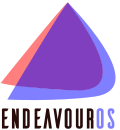This article needs to be updated.(January 2026) |
| EndeavourOS | |
|---|---|
 | |
 EndeavourOS Mercury Neo with KDE Plasma 6 | |
| Developer | Bryan Poerwoatmodjo, Fernando Omiechuk Frozi, Johannes Kamprad, Manuel |
| OS family | Linux (Unix-like) |
| Working state | Current |
| Source model | Open-source |
| Initial release | EndeavourOS 19.6 / 15 July 2019 |
| Latest release | EndeavourOS Ganymede Neo [1] / 15 January 2026 |
| Marketing target | Personal computers |
| Update method | Rolling release (Pacman) |
| Package manager | Pacman, Yay |
| Supported platforms | |
| Kernel type | Monolithic (Linux kernel) |
| Default user interface | |
| Preceded by | Antergos |
| Official website | endeavouros |
EndeavourOS is an Arch Linux-based Linux distribution or distro. EndeavourOS began as a successor to Antergos, a discontinued distribution also based on Arch Linux. [2] [3] It uses the same rolling release schedule as Arch Linux, but periodically releases updated installation media (ISO files). As of January 15, 2026, the most recent release is "Endeavour Ganymede Neo", bringing minor updates following the "Neo" tradition. [1]